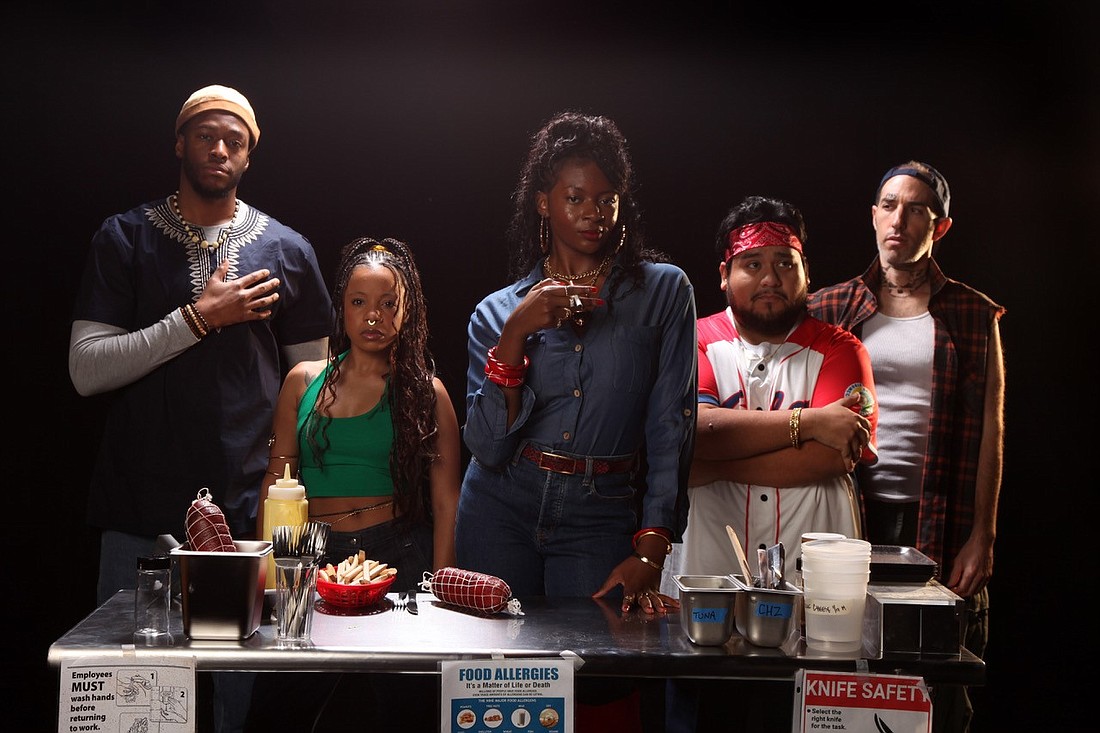- December 30, 2024
-
-
Loading

Loading

Lynn Nottage’s “Clyde’s” serves up sizzling dialogue and sharply drawn characters in this FSU/Asolo Conservatory production. Her play unfolds in a cheap sandwich joint with a truck-driver clientele. Clyde (the diner’s eponymous owner) is a felon who hires only other felons. That sounds like the recipe for a heart-warming redemption song. But second chances aren’t on Clyde’s menu.
Clyde’s kitchen is where the play’s at — “the back of the house,” in restaurant-speak. Inside, it’s a constant, hurry-up grind. Outside, Clyde (Jasmyn Ackah) is usually busy with customers. But she keeps popping up at the serving window — and ringing that damn bell. Ding! Ding! Ding!
One order after another. A relentless pace. But Montrellous (Ibukun Omotowa), the kitchen’s sandwich sensei, maintains his unflappable Zen calm. He’s a Kung Fu master in the mystic art of sandwiches. Montrellous groks the essence of each creation, and gladly shares his wisdom with the other three line cooks. His sandwiches always spark joy. His students’ creations fall short, but he’s teaching them.
But the sensei’s lessons end whenever the owner appears. Clyde barges into the kitchen like a knife-killer in a ’70s slasher flick. She only stabs her employees’ souls, but she spits on Montrellous’ art — literally.
Clyde spits on her staff’s dreams, too. To hell with the joy of cooking! To hell with that good review! Clyde wants quantity, not quality. She’s a mean ex-con in debt to even-meaner loan sharks.
To pay them off, Clyde needs money — and lots of it! Her lousy shop makes money by making lousy sandwiches for truck drivers. Keep doing that. Don’t try to do it better. Just do it faster. Any work-release wage-slaves who don’t like it can hit the door. And go directly to jail.
Nottage is a Kung Fu master in the playwright’s art. Her characters all speak with distinct voices. But a greater music unites their words. “Clyde’s” is a fugal symphony of repeated motifs: the ding of the bell; a sandwich tossed in the trash; Montrellous’ mystic insights; Clyde’s vitriolic bile. It’s a sharply defined structure. But Nottage breaks it up with real-world chaos. It never feels like artifice.
“Clyde’s” is a shotgun marriage of order and entropy. Director DeAnna S. Wright makes it work with a rope-a-dope approach. The sandwich joint’s galley slaves are stewing in tension. They resemble the whispering, hypervigilant children of an abusive parent. Clyde’s surprise visits kil conversations. Wright’s timing is excellent in these cobra strikes. She makes you feel their fear.
The actors make you feel everything. They’ve got great material to work with. Nottage defines her characters with throwaway lines, not expository monologs. That’s the best dialogue to write, but the hardest to perform. This cast is up for it.
Omotowa’s Montrellous is a straight-up good guy. Hell, he’s downright saintly. Nice guys are the toughest roles to play, but he pulls it off.
Over on the dark side, Jasmyn Ackah’s Clyde is a toxic person. (That’s like saying Attila the Hun had anger management issues.) Ackah’s bitter, bullying character simmers with gut-level rage. Look at her cross-eyed and she’ll bite your head off.
But looking away won’t save you. Clyde’s contempt falls like acid rain — and everyone gets burned. Her kitchen grunts can’t get on her good side. Clyde doesn’t have one. Ackah plays her as a vicious character, but viciously believable.
Brian Zane’s Jason is a working class white guy whose middle-class job was vaporized by corporate downsizing. His character lost everything. Then he lost it — and took it out on a strikebreaker’s face. In prison, Jason ran with an Aryan gang that marked him for life with hateful symbols on his flesh. (Tattooing “LOSER” on his forehead would’ve been kinder.) Zane makes you see the person behind the prisoner.
Ashley McCauley Moore’s Letitia is a sweet kid who got busted for selling pills. She’s now a single mom with a disabled kid and a cat’s cradle of obligations. Jonathan Acosta’s Rafael is an earnest artist in his own right. In Zen tradition, he has a beginner’s mind. His character only wants to learn whatever his sandwich sensei can teach him.
These talented student actors avoid the cookie-cutter tropes of scary ex-cons and play their characters as individuals who might not be so different from audience members. With the wrong word, the wrong drug, wrong place, wrong time, a bad week, or bad luck, we all might wind up in one of those dumpsters for discarded humans known as prisons. “There but for the grace of God go I.” Not an original insight. These actors make you feel it.
Other artists make you see (and hear) the play’s hellish kitchen. Andrea Herrera's costumes are perfect for parolees clinging onto the clean world without the funds to dress for success. Jeff Weber’s greasy kitchen set is realistically cluttered and seriously ugly. (Food industry vets will find it familiar.)
Chris McVicker’s harsh, unforgiving lighting evokes the world of empty objects in Sartre’s "Nausea." Dorian Boyd’s sound design tantalizes Clyde’s kitchen captives with hints of happy music — that quickly turn to silence or industrial noise.
These creative talents make the play’s world visible. The actors and director give its words flesh. But in beginning was the word. As I said, Nottage is a masterful playwright. But what’s she saying here? Wrong question.
“Clyde’s” has no message. It does have a core philosophy. If a hack writer or Chat GPT boiled it down a message, it might read something like …
Contempt and respect are self-fulfilling prophecies. Treat people like losers, bums of rejects and that’s what they’ll become. If you treat people like human beings with potential, they just might be the best they can be.
Seems obvious to me. But Nottage never hits that nail on the head. She ends her play ambiguously. That’s usually a lazy playwright’s cheat. Here, it’s not.